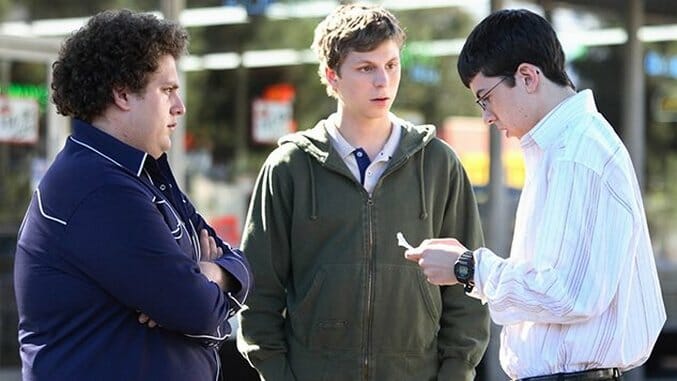Ten Years Ago, Superbad Subverted the Teen Sex Comedy

Every generation of teens has its generation of teen movies—my colleague Amy Glynn has been writing some excellent pieces about hers, the Hughesverse—and Greg Mottola’s Superbad is the epitome of mine. In Seth (Jonah Hill) and Evan (Michael Cera), my friends and I had a mirror for our own insecurity and awkwardness—they were our modern-day Anthony Michael Halls. In Fogell/McLovin (Christopher Mintz-Plasse), we had an icon of weird who somehow ended up a winner, a sort of photonegative of Ferris Bueller (Matthew Broderick). And in Superbad’s constant dick jokes (care of a script by namesakes Seth Rogen and Evan Goldberg), we had an accurate representation of the way we all talked, maturity be damned. The film would join the pantheon of mid-2000s comedies—most notably Anchorman and Step Brothers—that created a white-adolescent-boy language made up entirely of lewd, absurd references.
It’s been ten years since Rogen and Goldberg’s story hit theaters, just distant enough to judge the impact Superbad has had on both teen movies and comedies in general. On the whole, the film has aged reasonably well, with one notable exception: its liberal use of the word “fag,” which has gained proper and wide recognition as a very-not-OK slur in the decade since. For the most part, though, Superbad, destroyed the archetypal relationships of the teen flick, changing the types of conversations that movies of its ilk could have.
It’s a rom-com in many respects, but unlike its predecessors, Superbad is a romance between two buddies, a story wherein the ostensible sex drive is secondary to Platonic need. Most of John Hughes’ ’80s oeuvre centers on the cringe-worthy struggle of X character getting Y other character to notice their existence in order to have Y inevitably fall for X. No matter what else Sixteen Candles and Pretty in Pink have to say, their endgame remains Molly Ringwald getting with the correct Good Guy. Ditto Amy Heckerling’s iconic contributions to the genre, Fast Times at Ridgemont High and Clueless, and the literary reimaginings (Ten Things I Hate About You, et. al.) that followed in the latter’s wake. Despite her legendary status among female protagonists, Cher’s (Alicia Silverstone) great realization is that she loves her step-brother Josh—the best of Good Guy names, played by the Ultimate Hollywood Good Guy™, Paul Rudd. Of course, distilling a desire to get laid into true Good Guy romance is the entire raison d’etre of the American Pie series and its bawdy peers.
In Superbad, Seth and Evan’s versions of the Good Guy aren’t Jules (a precocious Emma Stone) and Becca (Martha MacIsaac): they’re each other. In the film’s denouement, with the two leads snuggled up close in sleeping bags, Seth literally says, “I just wanna go to the rooftops and scream, ‘I love my best friend, Evan.’” For teenage boys struggling with anxiety over the seeming hopelessness of losing their virginity, Superbad provides a welcome respite, an acknowledgement that focusing your entire life upon your dick is pointless when there’s fulfillment to be had by your side the entire time.
Superbad’s realism doesn’t stop at its depiction of male friendship. The film’s dialogue and characters leap out of hackneyed tropes and into a high school experience that lacks any silver screen sheen. Rather than being lazily tossed into the Unpopular Kid or Unappreciated Nice Boy bin, Seth and Evan are given complex social statuses—spit upon by bullies, yet well-liked enough to be invited to Jules’ party and garner the attention of girls who aren’t the Prom Queen or the Ugly Duckling. Jules herself destroys both the Popular Girl and Good Girl archetypes by combining the two: She’s the eye of the social hurricane who doesn’t drink, a type of person found far more frequently in real life than in movies. Becca, meanwhile, is an utterly quotidian character who doesn’t fit into any predefined teen flick role, which makes Evan’s attraction to her all the more a Hollywood unicorn. Like most couples, the two appear totally ordinary to third-party observers, reflecting Superbad’s insight that mutual attraction comes entirely from subjective perspective.
Instead of peddling wish fulfillment, the film operates in a universe of real people and their real relationships, and anyone watching could step into the characters’ shoes without having to launch themselves into fantasyland. Superbad shouldn’t get full credit for this development—The 40-Year-Old Virgin and Knocked Up both predate it—but teens, with their precarious self-esteem, are often in particularly dire need of a reality check and a healthy dose of earnestness. Superbad delivers both in a way that hadn’t really been the focus of teen sex comedies before, and which has arguably been the predominant milieu of all comedy ever since, even as great works like Master of None and The Big Sick add necessary perspectives of color to the overarching style.
-

-

-

-

-

-

-

-

-

-

-

-

-

-

-

-

-

-

-

-

-

-

-

-

-

-

-

-

-

-

-

-

-

-

-

-

-

-

-

-








































